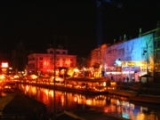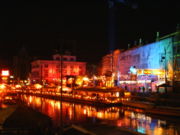
Gentse Feesten
Encyclopedia
The Gentse Feesten is a music and theatre festival in the city of Ghent
(Belgium
). Besides stage events there are random small street acts such as mimickers
, buskers, etc. It starts on the Saturday before July 21 (Belgium's national holiday) and lasts ten days. The last day (always a Monday) is known as De dag van de lege portemonnees (The day of the empty wallets) alluding to the fact that many people have spent their last penny at the festival, and is by the people of Ghent seen as their day while the stream of visitors from other places ceases.
The modern day Gentse Feesten were started in the summer of 1969 by Ghent singer Walter De Buck and the people from the Trefpunt cafe. In the beginning the festival consisted of one stage near the Saint Jacob Church. Since the late eighties the festival has grown enormously and now covers the whole inner city of Ghent.
Although the festival has become a mass event, it has retained some of the rebellious and anarchistic atmosphere of the early days. Public drunkenness is not entirely unseen.
and the Oktoberfest
in Munich
.
 Traditionally the shows at the festival have been free, but in the later years a number of side festivals have chosen the period of the Gentse Feesten to organize separate events.
Traditionally the shows at the festival have been free, but in the later years a number of side festivals have chosen the period of the Gentse Feesten to organize separate events.
Ghent
Ghent is a city and a municipality located in the Flemish region of Belgium. It is the capital and biggest city of the East Flanders province. The city started as a settlement at the confluence of the Rivers Scheldt and Lys and in the Middle Ages became one of the largest and richest cities of...
(Belgium
Belgium
Belgium , officially the Kingdom of Belgium, is a federal state in Western Europe. It is a founding member of the European Union and hosts the EU's headquarters, and those of several other major international organisations such as NATO.Belgium is also a member of, or affiliated to, many...
). Besides stage events there are random small street acts such as mimickers
Mime artist
A mime artist is someone who uses mime as a theatrical medium or as a performance art, involving miming, or the acting out a story through body motions, without use of speech. In earlier times, in English, such a performer was referred to as a mummer...
, buskers, etc. It starts on the Saturday before July 21 (Belgium's national holiday) and lasts ten days. The last day (always a Monday) is known as De dag van de lege portemonnees (The day of the empty wallets) alluding to the fact that many people have spent their last penny at the festival, and is by the people of Ghent seen as their day while the stream of visitors from other places ceases.
History
The first Gentse Feesten were held in 1843. The intensity of the festivities changed throughout the years, sometimes very strong and radiant (e.g. the 100-year anniversary was said to be very festive and lively), but sometimes also very low-key.The modern day Gentse Feesten were started in the summer of 1969 by Ghent singer Walter De Buck and the people from the Trefpunt cafe. In the beginning the festival consisted of one stage near the Saint Jacob Church. Since the late eighties the festival has grown enormously and now covers the whole inner city of Ghent.
Although the festival has become a mass event, it has retained some of the rebellious and anarchistic atmosphere of the early days. Public drunkenness is not entirely unseen.
Size
About 2 million visitors attend the festival every year, making it one of the biggest cultural and popular festivals in Europe. The number of unique visitors on top nights surpasses 250,000. In a 2005 ranking by www.localfestivities.com, the Gentse Feesten was called the third biggest city festival in Europe, only preceded by the Fallas in ValenciaValencia (city in Spain)
Valencia or València is the capital and most populous city of the autonomous community of Valencia and the third largest city in Spain, with a population of 809,267 in 2010. It is the 15th-most populous municipality in the European Union...
and the Oktoberfest
Oktoberfest
Oktoberfest, or Wiesn, is a 16–18 day beer festival held annually in Munich, Bavaria, Germany, running from late September to the first weekend in October. It is one of the most famous events in Germany and is the world's largest fair, with more than 5 million people attending every year. The...
in Munich
Munich
Munich The city's motto is "" . Before 2006, it was "Weltstadt mit Herz" . Its native name, , is derived from the Old High German Munichen, meaning "by the monks' place". The city's name derives from the monks of the Benedictine order who founded the city; hence the monk depicted on the city's coat...
.
Festivals within the Gentse Feesten

- Gent Jazz Festival (formerly Blue Note Festival) (since 2002): jazz festival, the first years in the Castle of CountsGravensteenThe Gravensteen is a castle in Ghent originating from the Middle Ages. The name means "castle of the count" in Dutch. -History:The present castle was built in 1180 by count Philip of Alsace and was modeled after the crusaders castles that Philip of Alsace encountered while he participated in the...
and then in the Bijloke abbey. - Comedy Festival Gent (since 2007): comedy festival at JOC Rabot, which also hosts a few English-speaking shows.
- International Puppetbuskerfestival: festival for puppet players spread over the whole city.
- International Street Theater Festival: street theater
- Polé Polé Festival (since 2003): World Music at the Korenlei and Graslei.
- Ten Days Off (since 1995): electronic dance music in the VooruitVooruitVooruit Arts Center is a historic complex in the Belgian city of Ghent. Vooruit was originally the festival and art center of the Ghent labor movement, with a ballroom, cinema, theater, etc...
. Around 20.000 visitors in 2005. - Boomtown (since 2002): Alternative music.
- Ground Zero Festival http://www.damberd.be (2009): Free no-nonsense music festival in Damberd Jazz-café on the Korenmarkt

